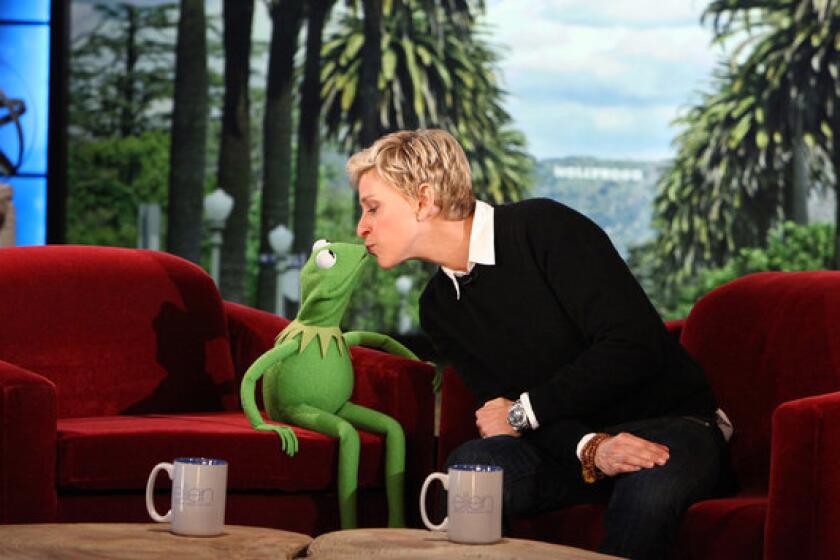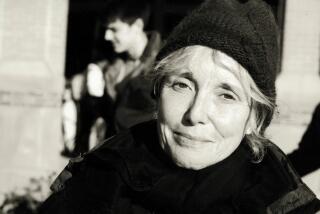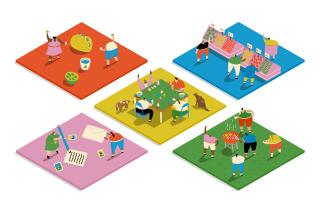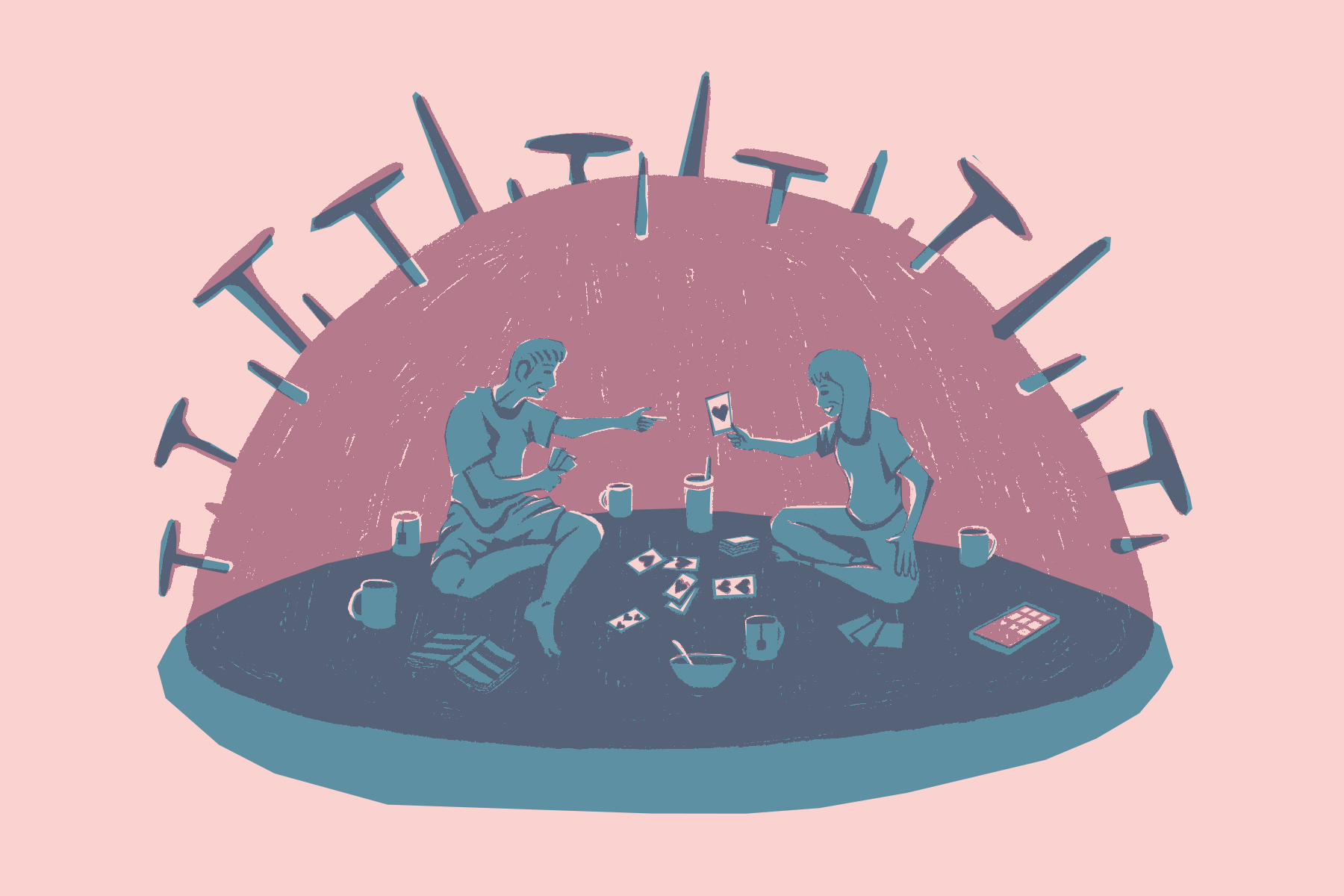Dating in a pandemic is tough. So she made TV’s first COVID-set romance
- Share via
At some point amid the chaos of pausing production on her Freeform series “Good Trouble” and shifting to a virtual writers room because of stay-at-home orders issued to combat the coronavirus, Joanna Johnson had an idea for a pandemic-themed limited series.
It began on a call with her manager, Robyn Meisinger, who mentioned her recent experience dating a guy on Zoom and how most singles have adapted their dating habits in lockdown. Meisinger had even read a few articles on the topic, which she promised to send over in case they might trigger some inspiration.
They did.
Originally conceived with the title “Love in the Time of Quarantine” — a nod to the 1985 novel by Gabriel García Márquez, “Love in the Time of Cholera” — Johnson came up with a contained series that focuses on interconnected groups of people dealing with relationship woes while in isolation.
“I really didn’t want to do a show about the virus,” Johnson said recently during a video conference call from her home. “It’s really about the effects of quarantine on relationships that are old and new.”
The four-episode series, now titled “Love in the Time of Corona,” will air over two nights beginning Saturday and becomes the first of several TV projects attempting to chronicle and process the experience of the pandemic — joining upcoming series like HBO’s “Coastal Elites,” Netflix’s “Social Distance,” and NBC’s “Connecting.” It arrives as Hollywood is steadily experimenting with creative workarounds to resume production while managing safety concerns.
‘Black-ish’ star and Emmy nominee Tracee Ellis Ross joins The Times’ TV podcast to talk sitcom tropes, ‘Girlfriends’ and getting flowers from Zendaya.
Lauren Corrao, Freeform’s head of original programming, says the network had received a few pandemic-related pitches in the unscripted space or for shows that could be produced virtually, but Johnson’s email pitch in late April was the first they received in the scripted dramedy space that would look like any other show on television pre-pandemic.
“It was exciting because we were all trying to figure out how to put original programming on,” she said. “I wanted to do it immediately ... I just didn’t know if it was going to be physically possible.”
About a week later, after internal discussions about safety and legal concerns, the series received the green light.
Johnson already had an idea of the kinds of relationships she wanted to explore, but she read a range of articles, including those sent over by her manager, to help shade each story. There was an L.A. Affairs column in The Times, in which a single woman shared what it was like navigating the dating app scene during a pandemic — complete with COVID-inspired quips on profiles. Another, from Today.com, featured funny social media posts from spouses sharing pet peeves about their partners that had been exacerbated by spending so much time with them in isolation. And a third piece, from the New Yorker, featured an interview with Esther Perel, a therapist who launched a special podcast called “Couples Under Lockdown.”
“I must have read 50 articles,” says Johnson. “So many people were sharing their experiences, and all the stories definitely inspired me because I think that truth is stranger than fiction.”
But Johnson wanted the intimacy of these stories to translate. She hoped to avoid a remotely produced series with a grid of faces on the screen. That meant casting real-life quarantining couples, families and friends — and having filming take place at their actual homes with a small crew using protocols suggested by Hollywood’s unions, as well as state and local guidelines. The four scripts were written over two weeks after casting was complete.
In the series, which takes place roughly around April, viewers meet James and Sade (played by Leslie Odom Jr. and wife Nicolette Robinson), a young couple who are considering having another baby; a recently separated coupled (played by Rya Kihlstedt and husband Gil Bellows) who are still living together and find themselves having to pretend everything is harmonious when their daughter (Ava Bellows) returns from college; co-dependent besties Elle (Rainey Qualley) and Oscar (Tommy Dorfman), who are quarantining together and attempting to date online; and Nanda (L. Scott Caldwell), who struggles to accept that her husband, living in nursing home, is showing signs of dementia ahead of their big 50th-anniversary bash, which seems like it will be doomed by COVID-19.
Mixed in with the varied portraits of relationships are many hallmarks of quarantine — choreographed dance sequences familiar on TikTok, mentions of Sally Rooney’s “Normal People,” the careful suiting up before a grocery run, talk of not spreading oral droplets by wearing masks, and the bygone hopeful optimism that things might soon get back to normal.
The “Ellen” scandal has gripped us in part because it’s so familiar: From “Larry Sanders” to “The Morning Show,” TV sees itself as an awful place to work.
“What I wanted to feature in the show was that we’re social beings and we all are looking for love and connection — and even quarantine isn’t going to stop us,” Johnson says. “People are resilient and they’re determined. One thing I heard a lot is that people were rediscovering their families, rediscovering family dinners, rediscovering game night, having dance parties, cooking together and taking walks. We were craving camaraderie and we were able to slow down in ways that allowed for that.”
Johnson, who conceived the series as being akin to “Love Actually,” says she and the show’s other three writers found themselves rethinking its shape following George Floyd’s death and the subsequent protests for racial justice.
But they ran into a problem many Hollywood creatives have encountered as they try to adapt to a news cycle that moves faster than television production can keep up with. Because the action of “Love in the Time of Corona” is set before the recent protests against police brutality in the U.S. became the center of global attention in late May and early June, writers and network executives decided to scrap plans for a brief scene showing the characters making signs and saying the names of Black victims of violence, which they originally intended to combine with footage from the real-life protests.
Johnson says she even considered abandoning the series entirely.
“The shutdown, quarantine took on an entirely new chapter,” Johnson says. “Like, who would have fun with this? We know people are suffering. We wanted to make sure that we respected that. I seriously thought about pulling the plug. We talked it through. And then people said to me, ‘People want to see something positive. They want to see this.’”
To ensure that the series at least represented some aspect of the fear, anxiety and trauma that Black people have had to confront this year, being disproportionately affected by both the public health crisis and police brutality, Johnson incorporated a mention of Ahmaud Arbery’s death, which comes to inform the discussion between James and Sade (Odom Jr. and Robinson) about bringing another child into the world.
The stress and intensity of emotions felt in this time is partly why Johnson wanted to make the series only four half-hour episodes.
“I think a four-episode, two-night event is palatable,” says Johnson, who says production on “Good Trouble” is expected to begin in September. “I don’t think people want to turn on the TV and watch the coronavirus constantly. I look back on the experience and I am so glad we did it.”
'Love in the Time of Corona'
Where: Freeform
When: 8 and 8:35 p.m. Saturday and Sunday
Rating: TV-14 (may be unsuitable for children under the age of 14)
More to Read
The complete guide to home viewing
Get Screen Gab for everything about the TV shows and streaming movies everyone’s talking about.
You may occasionally receive promotional content from the Los Angeles Times.








